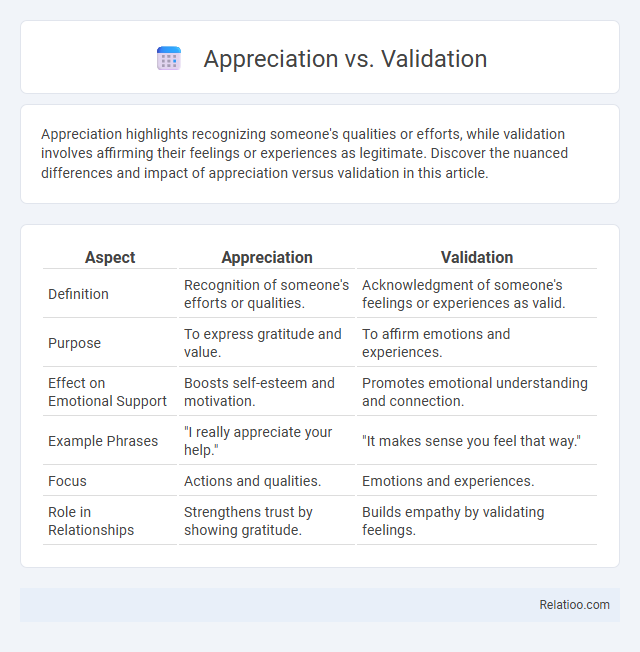Appreciation highlights recognizing someone's qualities or efforts, while validation involves affirming their feelings or experiences as legitimate. Discover the nuanced differences and impact of appreciation versus validation in this article.
Table of Comparison
| Aspect | Appreciation | Validation |
|---|---|---|
| Definition | Recognition of someone's efforts or qualities. | Acknowledgment of someone's feelings or experiences as valid. |
| Purpose | To express gratitude and value. | To affirm emotions and experiences. |
| Effect on Emotional Support | Boosts self-esteem and motivation. | Promotes emotional understanding and connection. |
| Example Phrases | "I really appreciate your help." | "It makes sense you feel that way." |
| Focus | Actions and qualities. | Emotions and experiences. |
| Role in Relationships | Strengthens trust by showing gratitude. | Builds empathy by validating feelings. |
Introduction to Appreciation and Validation
Appreciation involves recognizing and valuing someone's qualities or actions, fostering a positive emotional connection and motivation. Validation, on the other hand, confirms and acknowledges a person's feelings or experiences, promoting acceptance and understanding without necessarily offering praise. Both appreciation and validation play critical roles in building trust and enhancing interpersonal relationships by addressing different psychological needs.
Defining Appreciation: Meaning and Significance
Appreciation involves recognizing and valuing someone's qualities, efforts, or contributions, emphasizing genuine gratitude and positive acknowledgment. It fosters motivation and strengthens relationships by highlighting the importance of individual actions or traits without the need for external approval. Appreciation differs from validation, which confirms feelings or experiences, and from recognition, which often acknowledges achievement formally or publicly.
Understanding Validation: Key Concepts
Validation involves acknowledging and accepting another person's feelings, thoughts, or experiences as legitimate and understandable, which fosters emotional safety and trust. Appreciation is the recognition and expression of gratitude for someone's actions or qualities, enhancing motivation and positive relationships. Understanding validation means empathizing with Your emotions without judgment, creating a supportive environment that encourages open communication and self-acceptance.
The Psychological Impact of Appreciation
Appreciation deeply influences psychological well-being by fostering feelings of worth and belonging, which enhances self-esteem and motivation. Unlike validation, which confirms one's feelings or experiences, appreciation recognizes inherent value and contributions, leading to increased happiness and reduced stress. This positive reinforcement nurtures emotional resilience and strengthens interpersonal relationships.
The Role of Validation in Emotional Well-being
Validation plays a crucial role in emotional well-being by acknowledging and accepting Your feelings without judgment, fostering a sense of understanding and connection. Unlike appreciation, which expresses gratitude for actions or qualities, validation focuses on recognizing the legitimacy of Your emotions, helping to reduce feelings of isolation and increase self-worth. Effective validation supports mental health by promoting emotional resilience and encouraging open communication in relationships.
Key Differences: Appreciation vs Validation
Appreciation involves recognizing and valuing someone's qualities or actions, which boosts intrinsic motivation and feelings of worth. Validation confirms the accuracy or legitimacy of your feelings, experiences, or opinions, fostering emotional security and understanding. Understanding the key differences helps improve communication by ensuring that your actions either affirm someone's value (appreciation) or acknowledge their internal experience (validation).
Which Matters More in Relationships?
Validation directly addresses emotional needs by acknowledging feelings and experiences, fostering trust and deeper connection in relationships. Appreciation highlights positive actions and qualities, boosting motivation and reinforcing mutual respect. While both are important, validation typically matters more for emotional security, as it confirms understanding and acceptance beyond surface-level recognition.
Practical Ways to Show Appreciation
Showing appreciation involves expressing gratitude through specific actions like verbal praise, personalized thank-you notes, or small gestures that acknowledge effort and impact. Validation emphasizes recognizing and affirming someone's feelings or experiences by actively listening, reflecting emotions, and providing empathetic feedback. Practical ways to demonstrate appreciation include regularly acknowledging contributions in team meetings, offering meaningful rewards, and creating opportunities for growth and recognition aligned with individual preferences.
Effective Methods for Offering Validation
Effective methods for offering validation include active listening, empathetic responses, and acknowledging emotions without judgment, which enhance interpersonal trust and emotional connection. Using verbal affirmations that mirror the speaker's feelings demonstrates understanding and reinforces their experience, crucial for mental health and relationship building. Consistent validation fosters a supportive environment where individuals feel seen, respected, and motivated to express themselves openly.
Conclusion: Balancing Appreciation and Validation
Balancing appreciation and validation is crucial for fostering healthy relationships and promoting personal growth. Appreciation acknowledges the inherent value and efforts of individuals, while validation confirms their feelings and experiences as legitimate. Integrating both creates an environment where people feel genuinely recognized and emotionally supported, enhancing mutual respect and deeper connections.

Infographic: Appreciation vs Validation
 relatioo.com
relatioo.com